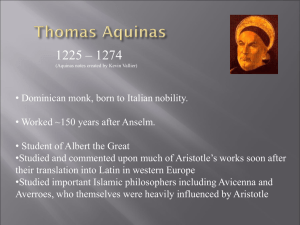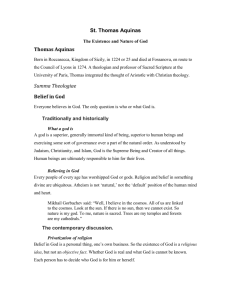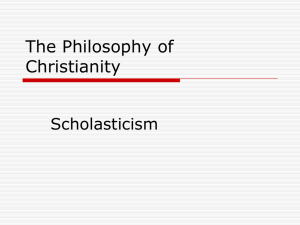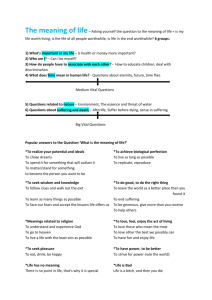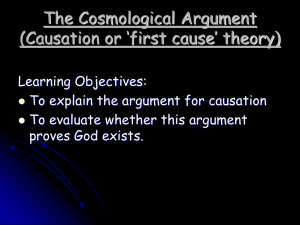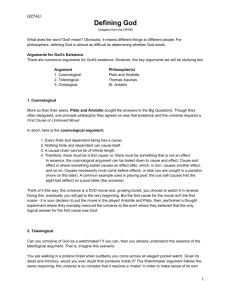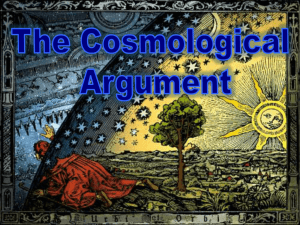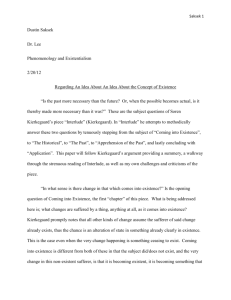File
advertisement
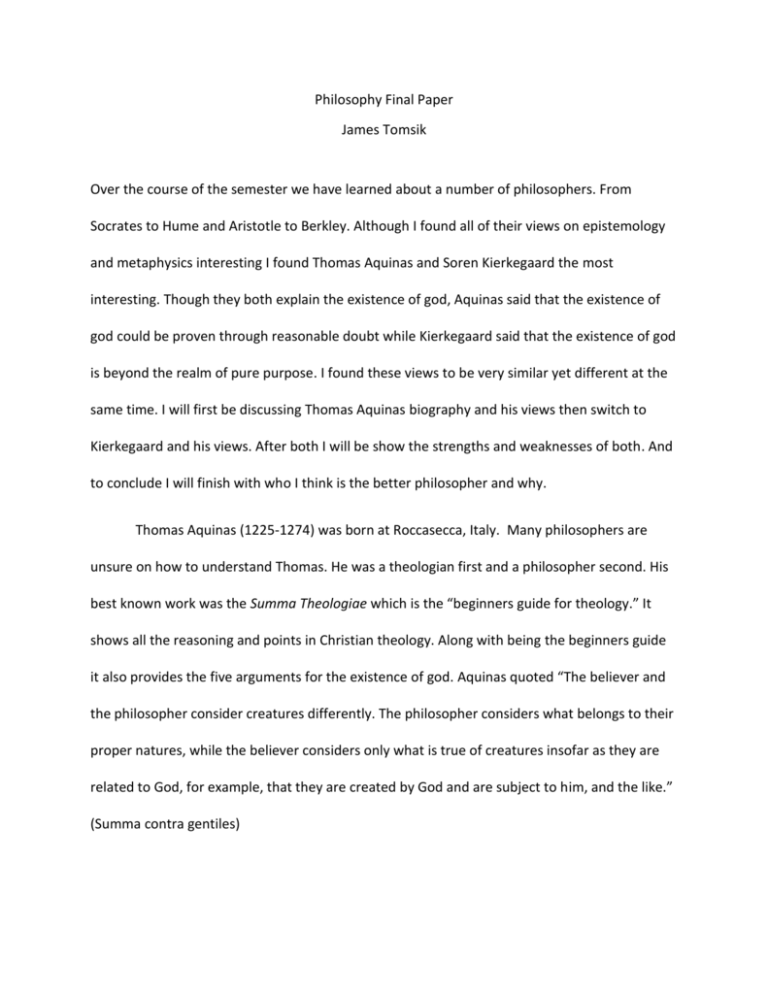
Philosophy Final Paper James Tomsik Over the course of the semester we have learned about a number of philosophers. From Socrates to Hume and Aristotle to Berkley. Although I found all of their views on epistemology and metaphysics interesting I found Thomas Aquinas and Soren Kierkegaard the most interesting. Though they both explain the existence of god, Aquinas said that the existence of god could be proven through reasonable doubt while Kierkegaard said that the existence of god is beyond the realm of pure purpose. I found these views to be very similar yet different at the same time. I will first be discussing Thomas Aquinas biography and his views then switch to Kierkegaard and his views. After both I will be show the strengths and weaknesses of both. And to conclude I will finish with who I think is the better philosopher and why. Thomas Aquinas (1225-1274) was born at Roccasecca, Italy. Many philosophers are unsure on how to understand Thomas. He was a theologian first and a philosopher second. His best known work was the Summa Theologiae which is the “beginners guide for theology.” It shows all the reasoning and points in Christian theology. Along with being the beginners guide it also provides the five arguments for the existence of god. Aquinas quoted “The believer and the philosopher consider creatures differently. The philosopher considers what belongs to their proper natures, while the believer considers only what is true of creatures insofar as they are related to God, for example, that they are created by God and are subject to him, and the like.” (Summa contra gentiles) Mentioned above the Summa Theologiae has five points that proves the existence of god. The 1st reason is the argument of the unmoved mover. It explains that god is the cause of all motion in the universe. It is in a way a cosmological argument and relates to Aristotle’s dichotomy of potentiality and actuality. The basis of the first argument is that a thing cannot move itself and that it requires a mover. An infinite regress of movers is impossible. Thus there is an unmoved mover that causes motion to all objects. And it happens that that mover is god. The 2nd is the argument of the first cause. It explains to prove that god must have been the cause or the creator of everything. It states that the universe must have a first cause. Everything that is caused is caused by something else. Aristotle describes the unmoved mover as being perfectly beautiful, indivisible, and contemplating only the perfect contemplation: itself contemplating. The summary of the first cause is to prove God’s existence. The 3rd argument is the argument from Contingency. It states that many things in the universe may either exist or not exist. Such things are called contingent beings. Aquinas’s argument from contingency allows for the possibility of a universe that has no beginning in time. To simplify this meaning it basically means that at one point in time nothing existed. But that nothing is able to bring anything into existence. That being whom was able to do so was god. The 4th argument is the argument from degree. This argument is heavily based upon the teachings of Aristotle. It states that varying perfections of varying degrees may be found throughout the universe. These points show the existence of an ultimate standard of greatness. The greatness had a pinnacle and that is who we called god. The 5th and final argument is the teleological argument. It claims that everything in the universe possess final causes that are directed by god. All objects are by themselves are unintelligent. Thomas Aquinas said that god created the universe in order to multiply his love. These are the 5 arguments that Aquinas had. Soren Kierkegaard (1813-1855) had a very uneventful life. Although his life was very uneventful he was the Father of Existentialism. Existential philosophy examines fundamental choices in life. Kierkegaard developed this from the Greek notion of judging philosophers by their lives rather than their intellectual artefacts. Kierkegaard had a very large sense of guilt and anxiety he inherited from his dad. His dad was a very wealthy man but when had a large sense of guilt because he impregnated Kierkegaard’s mother out of wedlock. Kierkegaard was engaged to a woman named Regina Olsen. She was an important aspect of his life. A year later from when he had proposed to his beloved he felt disillusioned about what he had done. He blamed the characteristics he had inherited from his father for making him unsuitable for marriage. Kierkegaard felt that his situation was much like Abraham sacrificing his son Isaac to show his love for god. Kierkegaard said “God creates out of nothing, but here, if I dare say so, he does more-he dresses an instinct in all the beauty of erotic love so that the lovers see only the beauty and are unaware of the instinct.” Kierkegaard had two influential ideas in terms of Theology. Subjectivity and the notion known as the leap of faith. The leap of faith is the concept of how an individual would believe in god or how a person would act in love. Faith is not a decision based on evidence. Certain truths about god are true and someone is worthy of love. Faith involves making commitment anyway. He said that you have to choose the world or god and that choosing one automatically excluded the other. Evidence without faith would have no real substance. Subjectivity is the importance of one’s self, and the relation to the world. He argued that subjectivity is truth and that truth is subjectivity. This has to do with the difference of what is the real truth and someone’s subjective relation to the truth. Kierkegaard talks about subjectivity when he talks about religious matters. He states that doubt is an element of faith and that it is impossible to gain any objective certainty about doctrines. While Aquinas has his 5 reasons for the existence of god, there are flaws in his system. They are five reasons for the existence of god. Not five reasons to prove the existence of god. For all these arguments there exist counter points. To counter the 1st it has committed the fallacy know as begging the question. The unmoved mover is god. However what is the cause to make god move? Although motion can’t have infinite regression, it is assumed that god had been not moving from infinity or he has been moving since nothing existed. The flaw for the 2nd argument is if nothing can cause itself to exist, how was god able to cause himself? Had god been in existence from eternity, what is the problem with a universe that has been in existence from infinity? E=mc2. Matter can be converted into energy and vice versa. Mass and energy have always been in existence. For all we know the universe could just be a manifestation of the changes in matter and energy. The counter point for argument 3 is that in modern day physics have demonstrated that there are no strict definitions of such things. In a universe that consists of probability and chaos, things exist without being depend on other things. But as mentioned above, matter and energy are equally dependent of each other. There are some theoretical situations that have a backward causation that is possible as long as they do not create temporal paradoxes. The Wheeler-Feynman absorber theory would best describe this. In short it says that based on the assumption that a solution to the electromagnetic field equations has to be symmetric with reference to time-inversion or retro-causality. The counter argument to argument number 4 is that Aquinas says that all positives absolutes to god as the pinnacle for all things. But it is logically possible that god is the pinnacle for all negatives. If there are degrees of cruelty, then god must be the cruelest being. If there are any acts of insanity then god must be the perfectly insane being. Thus being the pinnacle of perfection can be applied to the negative and positive traits of god. The 5th and final counter argument is that this argument is explained as the watchmaker argument. It is used by theologians and fundamentalists preachers as the best argument for the existence of god. But although the universe is complex and intricate, it does not mean that it needs a designer. Viewing the universe and systems to human-made objects such as a watch is committing a logical fallacy known as false analogy. If a complex objects needs a creator what could be more complex than a super-intelligent, all-powerful god? Well who created god? Disagreeing to the assumption of an intelligent creator, the universe exhibit randomness and probability. If this was all designed by the creator then they must not have any superfluous traits. There is only one big flaw to the notion of the “leap of faith.” The implication of taking a leap of faith can carry a positive or negative connotations. A virtue as some would say, is able to believe in something without the evidence while others feel is it foolishness. It is a contested theological and philosophical concept. People often refer to Jesus as the “absolute paradox” because principles argue that reason and logic, rather than revelation or tradition, should be the basis of belief. Although Thomas Aquinas has more flaws in his reasons that gods exist, I feel he is the better philosopher. Leaving everything to faith is preposterous. Aquinas’s arguments on the existence of god are scientific and very logical. But Kierkegaard’s “leap of faith” is a 50% guarantee that god’s existence is righteous. So to conclude I find Aquinas the better philosopher because he provides logical opinions rather than leaving everything to a leap of faith.


